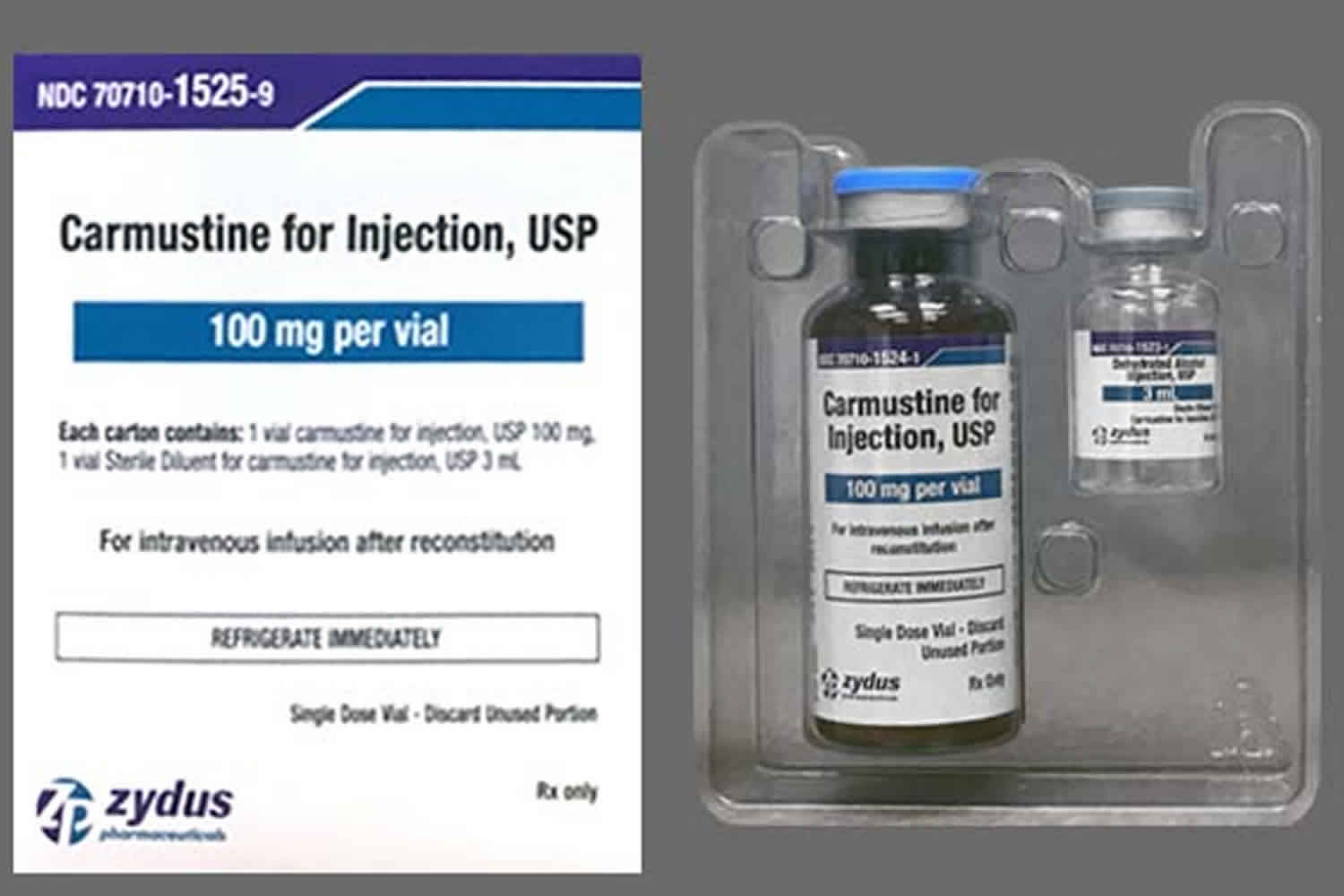Carmustine
Carmustine injection also called BCNU or BiCNU, is a cancer medicine used to treat certain types of brain tumors. Carmustine injection is also used with prednisone to treat multiple myeloma (a type of cancer of the bone marrow) and with other drugs to treat Hodgkin lymphoma (Hodgkin’s disease) and non-Hodgkin lymphoma (cancer that begins in the cells of the immune system) that have not gotten better with other treatment or has worsened after treatment with other medications. Carmustine injection is also being studied in the treatment of other types of cancer. Carmustine damages the cell’s DNA and may kill cancer cells. Carmustine is a type of alkylating agent and a type of nitrosourea. It works by slowing or stopping the growth of cancer cells in your body.
Carmustine injection comes as a powder to be added to fluid and injected over at least 2 hours intravenously (into a vein) by a doctor or nurse in a medical office or hospital outpatient clinic. It is usually injected once every 6 weeks. It may also be injected in smaller doses once a day for 2 days in a row every 6 weeks.
Your doctor may need to delay your treatment or adjust your dose if you experience certain side effects. It is important for you to tell your doctor how you are feeling during your treatment with carmustine.
Ask your pharmacist or doctor for a copy of the manufacturer’s information for the patient.
Carmustine can cause a severe decrease in the number of blood cells in your bone marrow. This increases the risk that you will develop a serious infection or bleeding. If you experience any of the following symptoms, call your doctor immediately: fever, sore throat, chills, or other signs of infection; unusual bleeding or bruising; black and tarry stools; red blood in stools; bloody vomit; vomited material that looks like coffee grounds.
Carmustine also can cause lung damage, even years after treatment. The lung damage can cause death, especially in patients treated with carmustine as children. Tell your doctor if you have or have ever had lung disease.
Keep all appointments with your doctor and the laboratory. Your doctor will order certain tests to check your body’s response to carmustine.
Carmustine wafer
Carmustine implant is a synthetic, biodegradable wafer containing the agent carmustine with antineoplastic activity. Carmustine wafer is used to deliver drug directly into a brain tumor site and typically implanted post-surgically, the wafer is made of a biodegradable poly-anhydride copolymer and contains the nitrosourea carmustine. Carmustine wafer has a coating that dissolves slowly and releases carmustine directly into the area where the tumor was removed. For brain tumors, this form may work better than other forms of carmustine and have fewer side effects. Carmustine is also available in a non-wafer form.
As an antineoplastic nitrosourea, carmustine alkylates and cross-links DNA during all phases of the cell cycle, resulting in disruption of DNA function, cell cycle arrest, and apoptosis. Carmustine also carbamoylates proteins, including DNA repair enzymes, resulting in an enhanced cytotoxic effect. Carmustine is highly lipophilic and crosses the blood-brain barrier readily.
Carmustine wafer is approved to treat:
- Glioblastoma multiforme that has recurred (come back). It is used with surgery.
- Malignant glioma that is high grade and has not been treated. It is used with surgery and radiation therapy.
Carmustine special precautions
Before receiving carmustine injection:
- tell your doctor and pharmacist if you are allergic to carmustine or any of the ingredients in carmustine injection. Ask your pharmacist for a list of the ingredients.
- tell your doctor and pharmacist what prescription and nonprescription medications, vitamins, nutritional supplements, you are taking or plan to take. Be sure to mention any of the following: cimetidine (Tagamet) and phenytoin (Dilantin). Your doctor may need to change the doses of your medications or monitor you carefully for side effects. Other medications may also interact with carmustine, so be sure to tell your doctor about all the medications you are taking, even those that do not appear on this list.
- tell your doctor if you have or have ever had kidney or liver disease.
- tell your doctor if you are pregnant, plan to become pregnant, or are breast-feeding. You should not become pregnant while you are receiving carmustine injection. If you become pregnant while receiving carmustine, call your doctor. Carmustine may harm the fetus.
Medicines used to treat cancer are very strong and can have many side effects. Before receiving carmustine, make sure you understand all the risks and benefits. It is important for you to work closely with your doctor during your treatment.
A nurse or other trained health professional will give you carmustine in a hospital. Carmustine injection is given through a needle placed in one of your veins.
Carmustine injection is usually given every 6 weeks. This maybe given as a single dose or divided into daily injections on 2 consecutive days.
Carmustine injection is sometimes given together with certain other medicines. If you are using a combination of medicines, it is important that you receive each one at the proper time. If you are taking some of these medicines by mouth, ask your doctor to help you plan a way to take them at the right times.
Carmustine injection often causes nausea and vomiting, which usually last no longer than 4 to 6 hours. It is very important that you continue to receive the medicine, even if you begin to feel ill. Ask your doctor for ways to lessen these effects.
It is very important that your doctor check your progress at regular visits to make sure that carmustine is working properly. Blood and urine tests may be needed to check for unwanted effects.
Using carmustine while you are pregnant can harm your unborn baby. Females need to use an effective form of birth control during treatment and for at least 6 months while you are using carmustine to keep from getting pregnant. If you think you have become pregnant while using the medicine, tell your doctor right away. Males need to use an effective form of contraceptive during treatment and for at least 3 months after your last dose to prevent your partner from becoming pregnant.
This medicine may increase your risk of developing cancer and lung problems (such as pulmonary fibrosis or toxicity). This is more likely if you receive high doses of carmustine or use it for a long time.
While you are being treated with carmustine injection, and after you stop treatment with it, do not have any immunizations (vaccines) without your doctor’s approval. Carmustine may lower your body’s resistance and the vaccine may not work as well for you or you might get the infection the vaccine is meant to prevent. In addition, you should not be around other persons living in your household who receive live vaccines because there is a chance they could pass the virus on to you. Some examples of live vaccines include measles, mumps, influenza (nasal flu vaccine), poliovirus (oral form), rotavirus, and rubella. Do not get close to them and do not stay in the same room with them for very long. If you have questions about this, talk to your doctor.
Carmustine can temporarily lower the number of white blood cells in your blood, increasing the chance of getting an infection. It can also lower the number of platelets, which are necessary for proper blood clotting. If this occurs, there are certain precautions you can take, especially when your blood count is low, to reduce the risk of infection or bleeding:
- If you can, avoid people with infections. Check with your doctor immediately if you think you are getting an infection or if you get a fever or chills, cough or hoarseness, lower back or side pain, or painful or difficult urination.
- Check with your doctor immediately if you notice any unusual bleeding or bruising, black, tarry stools, blood in the urine or stools, or pinpoint red spots on your skin.
- Be careful when using a regular toothbrush, dental floss, or toothpick. Your medical doctor, dentist, or nurse may recommend other ways to clean your teeth and gums. Check with your medical doctor before having any dental work done.
- Do not touch your eyes or the inside of your nose unless you have just washed your hands and have not touched anything else in the meantime.
- Be careful not to cut yourself when you are using sharp objects such as a safety razor or fingernail or toenail cutters.
- Avoid contact sports or other situations where bruising or injury could occur.
If carmustine accidentally seeps out of the vein into which it is injected, it may damage some tissues and cause scarring. Tell the doctor or nurse right away if you notice redness, pain, or swelling at the injection site.
This medicine may increase risk of lung problems while smoking.
If you plan to have children, talk with your doctor before using carmustine. Some men using carmustine have become infertile (unable to have children).
Do not take other medicines unless they have been discussed with your doctor. This includes prescription or nonprescription (over-the-counter [OTC]) medicines and herbal or vitamin supplements.
Allergies
Tell your doctor if you have ever had any unusual or allergic reaction to this medicine or any other medicines. Also tell your health care professional if you have any other types of allergies, such as to foods, dyes, preservatives, or animals. For non-prescription products, read the label or package ingredients carefully.
Children
Appropriate studies on the relationship of age to the effects of carmustine injection have not been performed in the pediatric population. Safety and efficacy have not been established.
Geriatric
No information is available on the relationship of age to the effects of carmustine injection in geriatric patients. However, elderly patients are more likely to have age-related kidney, liver, or heart problems, which may require caution and an adjustment in the dose for patients receiving carmustine injection.
Breastfeeding
There are no adequate studies in women for determining infant risk when using this medication during breastfeeding. Weigh the potential benefits against the potential risks before taking this medication while breastfeeding.
Drug interactions
Although certain medicines should not be used together at all, in other cases two different medicines may be used together even if an interaction might occur. In these cases, your doctor may want to change the dose, or other precautions may be necessary. When you are receiving carmustine, it is especially important that your healthcare professional know if you are taking any of the medicines listed below. The following interactions have been selected on the basis of their potential significance and are not necessarily all-inclusive.
Using carmustine with any of the following medicines is not recommended. Your doctor may decide not to treat you with this medication or change some of the other medicines you take.
- Measles Virus Vaccine, Live
- Mumps Virus Vaccine, Live
- Rotavirus Vaccine, Live
- Rubella Virus Vaccine, Live
- Varicella Virus Vaccine, Live
- Zoster Vaccine, Live
Using carmustine with any of the following medicines is usually not recommended, but may be required in some cases. If both medicines are prescribed together, your doctor may change the dose or how often you use one or both of the medicines.
- Adenovirus Vaccine
- Bacillus of Calmette and Guerin Vaccine, Live
- Cholera Vaccine, Live
- Cimetidine
- Dengue Tetravalent Vaccine, Live
- Influenza Virus Vaccine, Live
- Phenobarbital
- Poliovirus Vaccine, Live
- Smallpox Vaccine
- Typhoid Vaccine
- Yellow Fever Vaccine
Other interactions
Certain medicines should not be used at or around the time of eating food or eating certain types of food since interactions may occur. Using alcohol or tobacco with certain medicines may also cause interactions to occur. Discuss with your healthcare professional the use of your medicine with food, alcohol, or tobacco.
Other medical problems
The presence of other medical problems may affect the use of this medicine. Make sure you tell your doctor if you have any other medical problems, especially:
- Anemia (low red cells in the blood) or
- Bone marrow problems (eg, leukemia) or
- Leukopenia or neutropenia (low white cells in the blood) or
- Liver disease or
- Lung disease (eg, pulmonary fibrosis, pulmonary toxicity) or
- Thrombocytopenia (low platelets in the blood)—Use with caution. May make these conditions worse.
- Kidney disease—Use with caution. The effects may be increased because of slower removal of the medicine from the body.
Carmustine uses in cancer
Carmustine is approved to be used alone or with other drugs to treat:
- Brain tumors (certain types).
- Hodgkin lymphoma. It is used with other drugs in patients whose disease has not gotten better with other treatment or has recurred (come back).
- Multiple myeloma. It is used with prednisone.
- Non-Hodgkin lymphoma. It is used with other drugs in patients whose disease has not gotten better with other treatment or has recurred (come back).
Carmustine is also being studied in the treatment of other types of cancer.
Carmustine side effects
Carmustine may cause side effects. Tell your doctor if any of these symptoms are severe or do not go away:
- nausea
- vomiting
- headache
- loss of balance or coordination
- pale skin
- fainting
- dizziness
- fast or irregular heartbeat
- chest pain
- darkened skin
Some side effects can be serious. If you experience any of these symptoms or those listed in the IMPORTANT WARNING section, call your doctor immediately:
- swelling, pain, redness, or burning at the injection site
- upset stomach
- extreme tiredness or weakness
- lack of energy
- loss of appetite
- pain in the upper right part of the stomach
- yellowing of the skin or eyes
- decreased urination
- swelling of the hands, feet, ankles, or lower legs
Carmustine injection may cause other side effects. Call your doctor if you have any unusual problems while taking this medication.
Carmustine may increase the risk that you will develop other cancers. Talk to your doctor about the risk(s) of receiving carmustine injection.





